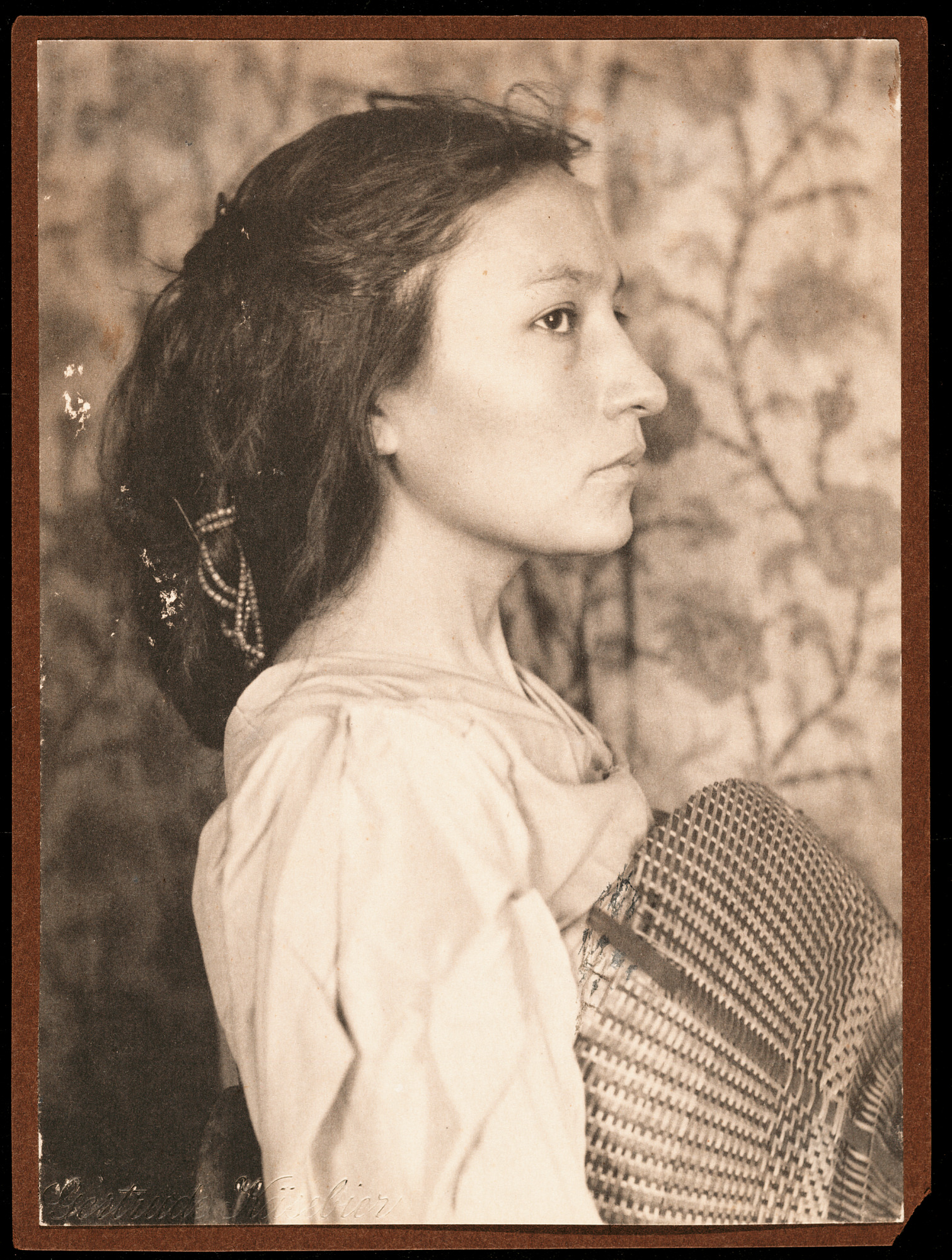Zitkála-Šá << ziht KAH luh shah >> (1876-1938) was an Indigenous (native) American educator, musician, and political activist. Her name means Red Bird in the Lakota dialect of the Sioux language. She is also known by the name Gertrude Simmons Bonnin. She was a member of a people known as the Yankton Sioux or Yankton Dakota. Zitkála-Šá became known for writing about the rights and culture of Indigenous Americans. She wrote Sun Dance (1913), the first Indigenous American opera. 
According to records, Gertrude Simmons was born on Feb. 22, 1876, on the Yankton Reservation in what is now southeastern South Dakota. Her mother, the Sioux Ellen Tate Iyohinwin, had married a white man with the last name Felker, who fathered Zitkála-Šá. The couple separated before Zitkála-Šá was born. Her mother later remarried a white man named John Haysting Simmons and passed his name on to Zitkála-Šá.
Zitkála-Šá grew up speaking the Nakota dialect of the Sioux language. When she was about 8 years old, she left the reservation to attend White’s Indiana Manual Labor Institute in Wabash, Indiana. The school required students to cut their long hair and participate in Quaker prayer. Zitkála-Šá learned to read, write, and play the violin.
In 1887, she returned to the reservation. She attended Santee Normal Training School, a boarding school in Nebraska. She returned to White’s in December 1891. Zitkála-Šá graduated in 1895, speaking about women’s rights at graduation. She accepted a scholarship to Earlham College in Richmond, Indiana. She began teaching music at the Carlisle Indian Industrial School in Pennsylvania. In 1899, she studied violin at the New England Conservatory of Music in Boston, Massachusetts.
In 1900, Zitkála-Šá accepted an invitation to travel and play with the Carlisle school’s band across the United States and at the Paris Exposition, a world’s fair. The school sent Zitkála-Šá back to the Yankton Reservation in 1900 to gather more students. There, she found her community in poverty, with run-down houses and white settlers living on her people’s land. She returned to Carlisle and began writing about Indigenous life and culture. She translated Indigenous stories into English and Latin. She criticized the Indigenous American boarding school system in essays published in the magazines Atlantic Monthly and Harper’s Magazine. In 1901, she wrote the short story “The Soft-Hearted Sioux” about a student’s loss of identity and was fired from the Carlisle school.
She returned to the reservation and began writing stories for her collection of Sioux tales and legends, Old Indian Legends (1901), while working as a clerk for the Bureau of Indian Affairs (BIA) office at Standing Rock. In 1902, she married Captain Raymond Talesfase Bonnin. They moved to the Uintah and Ouray Reservation in Utah and had a son named Raymond Ohiya Bonnin in 1903.
In 1910, Zitkála-Šá collaborated with composer William F. Hanson. They wrote an opera called Sun Dance, which debuted in 1913, based on the then-outlawed Indigenous religious ceremony (see Sun dance). Zitkála-Šá wrote the songs for the opera.
Zitkála-Šá joined the Society of American Indians, which preserved Indigenous traditions while fighting for full U.S. citizenship. Zitkála-Šá became the society’s secretary in 1916. She began writing criticisms of the BIA, where her husband worked, which led to his firing. In 1916, they moved to Washington, D.C., where she continued working with the Society of American Indians. Zitkála-Šá edited American Indian Magazine from 1916 to 1919. She lectured across the country about Indigenous culture and the right to be recognized as American citizens and to vote. Her American Indian Stories, a collection of essays on Indigenous treatment in America and in Christian boarding schools, was published in 1921.
The Indian Citizenship Act passed in 1924, granting citizenship to Indigenous people. But poll taxes, literacy tests, and violence and intimidation were used to prevent many Indigenous people from voting. Zitkála-Šá and her husband started the National Council of American Indians in 1926 to gain suffrage (the right to vote) for all Indigenous Americans. She continued to work for the rights and cultural preservation of Indigenous people until her death. She died in Washington, D.C., on Jan. 26, 1938, and she is buried in Arlington National Cemetery.
Dreams and Thunder: Stories, Poems, and The Sun Dance Opera is a collection of writings by Zitkála-Šá published in 2001. It includes poems, previously unpublished stories, and the libretto (words) of Sun Dance.
